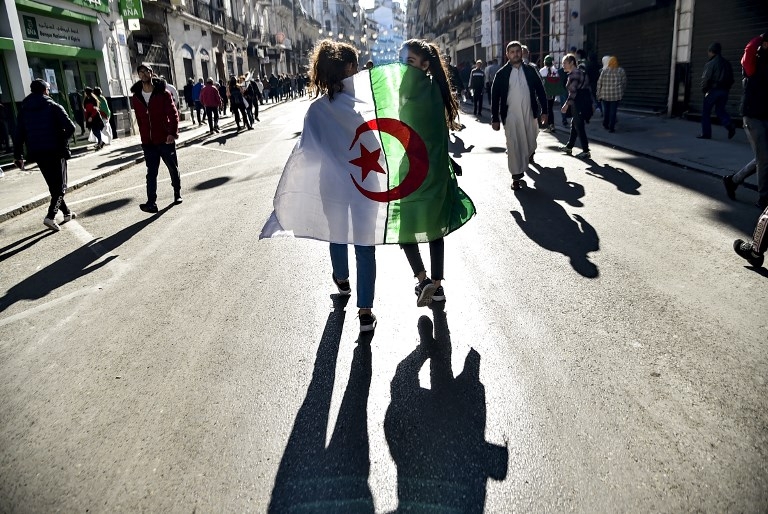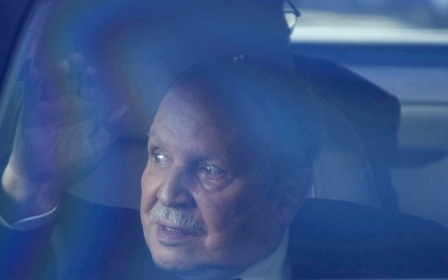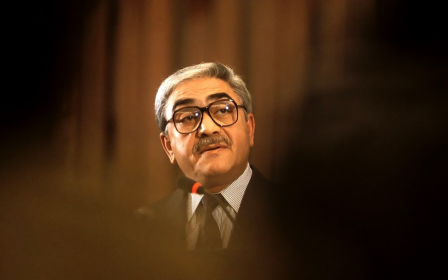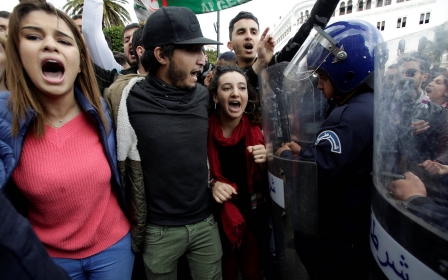Algeria: Army chief calls on Bouteflika to 'immediately' be deemed unfit to rule

The head of the Algerian army has reiterated his call to invoke a clause in the country's constitution to force President Abdelaziz Bouteflika out of office, as weeks of political unrest in the North African country continue.
Lieutenant General Ahmed Gaed Salah, the army's chief of staff, called on Tuesday for the Algerian authorities to "immediately apply the constitutional solution" to remove Bouteflika, the state-run Algeria Press Service reported.
Salah said the authorities should invoke Articles 7, 8 and 102 of the constitution, the last of which allows for the removal of the president if they are deemed unfit to rule for medical reasons.
"Thus, we believe there is no time left to lose and we need to immediately apply the proposed constitutional solution - the application of Articles 7, 8 and 102," Salah said in a statement, as reported by APS.
He also said it's necessary "to start the process to guarantee the management of state affairs within a legitimate, constitutional framework".
The military leader's comments come exactly one week after he first proposed invoking Article 102 to oust Bouteflika, who has faced several weeks of mass protests in Algiers and across the country.
Article 102 of the Algerian constitution
+ Show - HideArticle 102 is a clause in the Algerian constitution that allows for the removal of the president if they are deemed unfit to rule because of medical reasons.
The article has to be unanimously invoked by 12 members of the Constitutional Council.
If the Constitutional Council finds a reason to impeach the president, then parliament will declare the president incapacitated by 2/3 majority. Then the head of the upper house of the Algerian parliament will become interim head of state for 45 days.
If the reason for the president's impeachment continues after 45 days, then the head of Senate continues ruling Algeria for another 90 days, after which presidential elections are organised.
The protesters first took to the streets in February to show their opposition to the ailing 82-year-old president's bid for a fifth term in office.
Hundreds of thousands of Algerians have continued to demonstrate despite Bouteflika's promise not to seek re-election and have since called for "radical" political change.
Bouteflika, who has rarely been seen in public since suffering a stroke in 2013, said on Monday that he would step down before the end of his current presidential term, which expires on 28 April.
Uncertain transition
Salah, the army chief, on Tuesday invoked two other clauses in the Algerian constitution in his call for Bouteflika to be removed as president.
Article 7 of the constitution states that "the people are the source of all power" and that "national sovereignty belongs exclusively to the people". Article 8 continues in a similar vein, stating that "the people exercise their sovereignty through the institutions they give themselves".
"The people also exercise [their sovereignty] through referendum and through their elected representatives," Article 8 also states.
Also on Tuesday, former Algerian President Liamine Zeroual said he turned down an offer to lead a transitional government upon Bouteflika's resignation.
On 11 March, when Bouteflika announced he wouldn't run for office again and postponed the country's elections, he also proposed setting up a national conference to come up with a plan for Algeria's political transition.
Algerian protesters, political opposition figures and other critics have accused Bouteflika's camp of seeking to use the transition process to install one of the president's lackeys in his stead.
The president's planned resignation has prompted questions about who will take over once he's stepped aside. Critics have pointed out that the long-term leader was only the figurehead of an Algerian "deep state".
The idea of Bouteflika's inner circle retaining its grip on power through a substitute leader has drawn short shrift from protesters dealing with high unemployment and economic hardships.
Middle East Eye propose une couverture et une analyse indépendantes et incomparables du Moyen-Orient, de l’Afrique du Nord et d’autres régions du monde. Pour en savoir plus sur la reprise de ce contenu et les frais qui s’appliquent, veuillez remplir ce formulaire [en anglais]. Pour en savoir plus sur MEE, cliquez ici [en anglais].




